In-depth anatomy of Python functions
This article mainly introduces the in-depth anatomy of Python functions. The editor thinks it is quite good, so I will share it with you now and give it as a reference. Let’s follow the editor and take a look.
1. Creation and calling of functions
Define functions, don’t know how To execute the function;
If you want to execute the function, you need to call the function: Method to call the function: function name ()
1, () Create a function without parameters; call the function and execute the code in the function
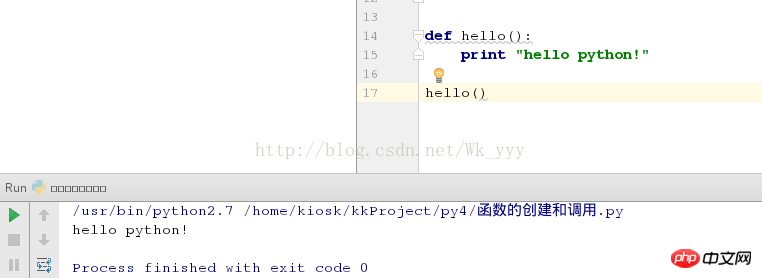
##2. Addition function: formal parameters are in parentheses; values must be passed; actual parameters are in add

Square function; the formal parameters are in parentheses; x is called a required parameter, and a value must be passed; y=2 is called the default parameter. You can pass a value. If no value is passed, the default value is
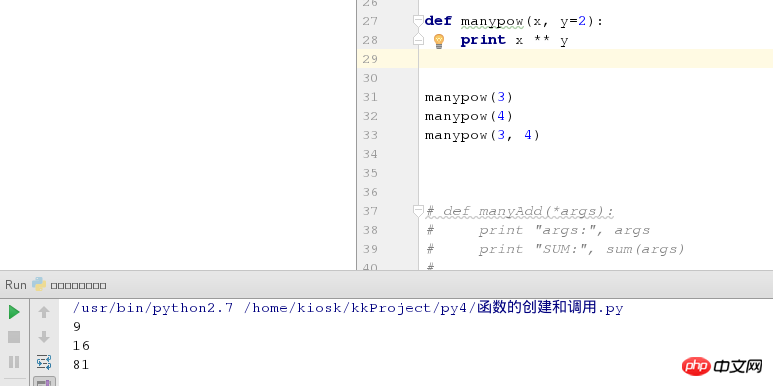
##4,
Multi-value addition: formal parameters are in parentheses; *args are called variable parameters, and multiple values can be passed, args is the data type of the tuple
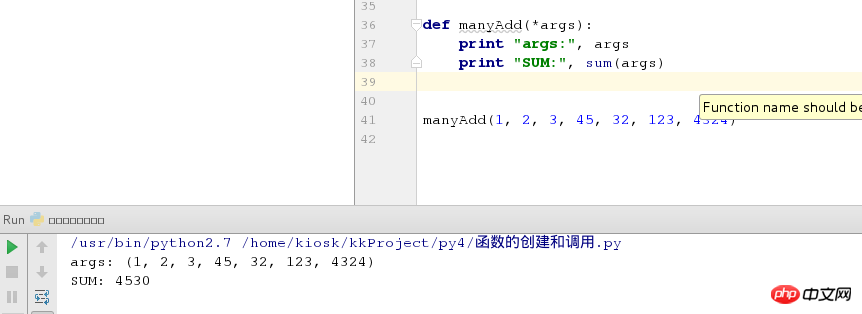
##5,
are called keyword parameters. Multiple key-value values can be passed when calling; kwargs is the data type of dictionary
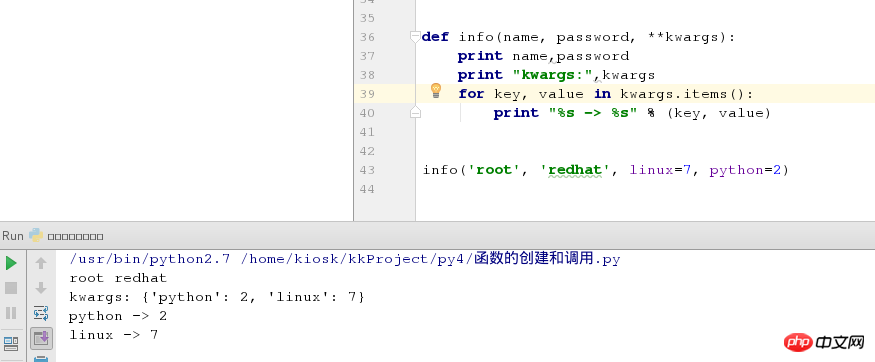 ##Note: When there are multiple formal parameters , Order: Required parameters>Default parameters>Variable parameters>Keywords
##Note: When there are multiple formal parameters , Order: Required parameters>Default parameters>Variable parameters>Keywords
#2. The return value of the function
1. Functions generally have return Return value; if you want to print the return value, you must print
2. In python, if When there is no return, a None is returned by default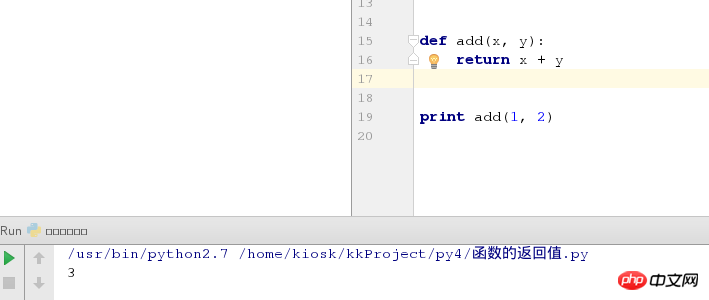
##3,  return default
return default
can only return one value; if
return must return multiple values, it will encapsulate these multiple values into a tuple and return minMax is the tuple type
##4,
Once the function encounters 
return
print function name () is used to print the function return value
3. Unpacking the actual parameters of the function
1. List unpacking *list name
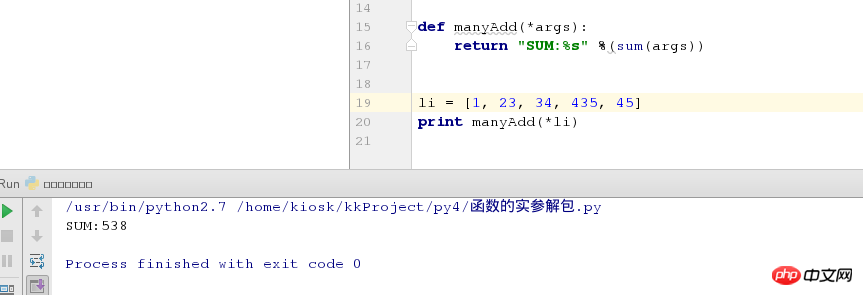
2. Dictionary unpacking**Dictionary name
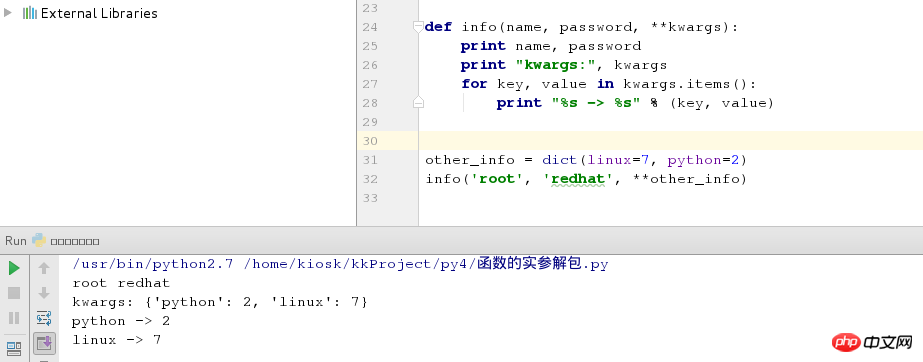
4. Scope of function
1. count=100 global variables, count=200 local variables; the variables in the function only take effect inside the function
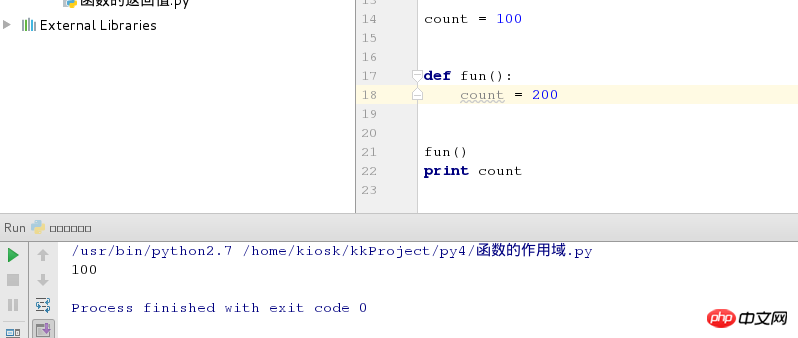
2. An error will be reported when outputting between global variables and local variables
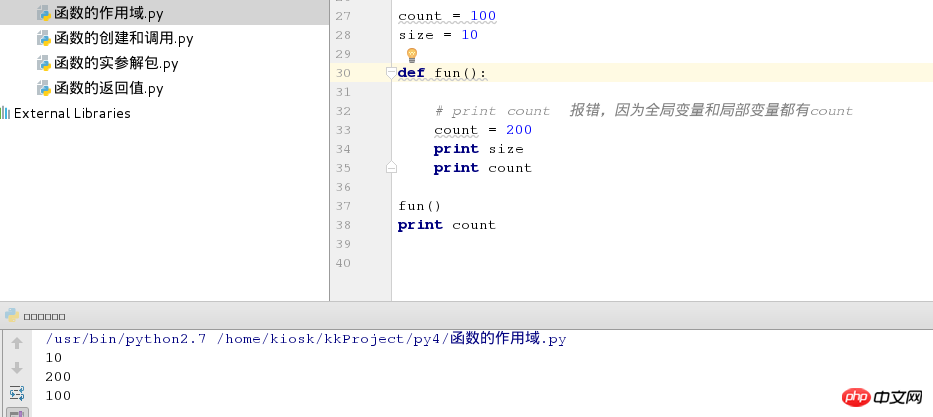
3. global is the keyword to declare local variables as global variables
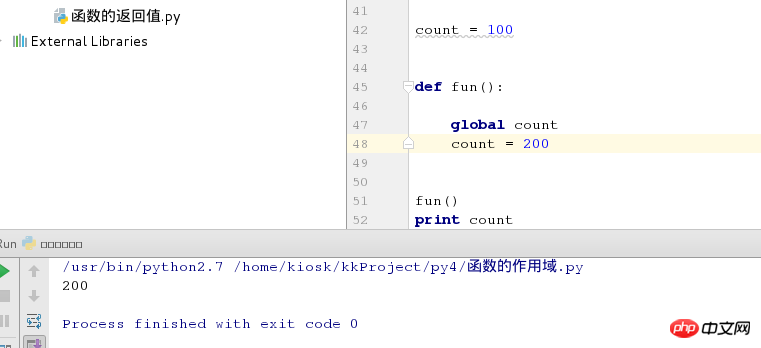
5. Function Application
1. NetEase Interview: Enter a word, the length is less than 100 , determine whether the word is composed entirely of uppercase letters and does not have two consecutive repeated letters. If so, output 'Like', otherwise output 'Dislike'
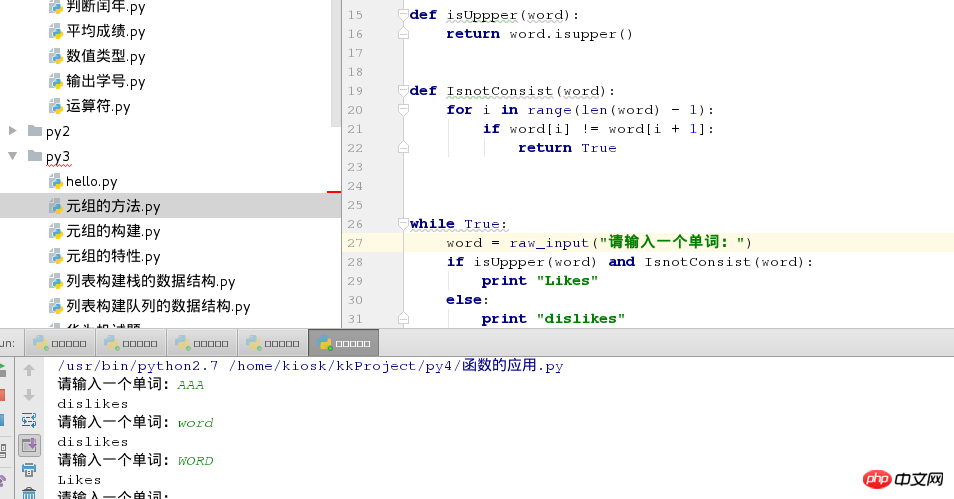
# 6. Use of functions -Implement the switch judgment statement through a dictionary
The meaning of an exception thrown: Let the original normal code report an error without performing the following operations
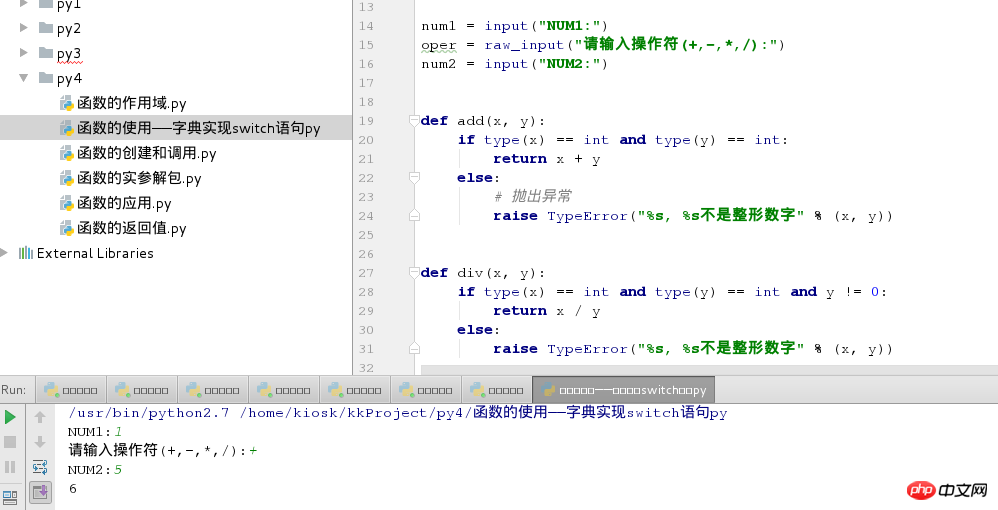
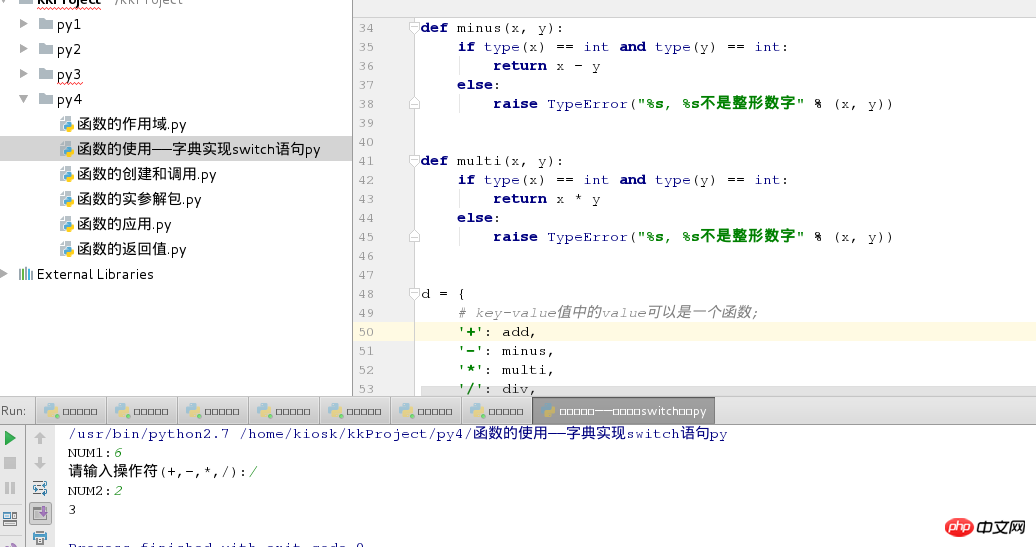
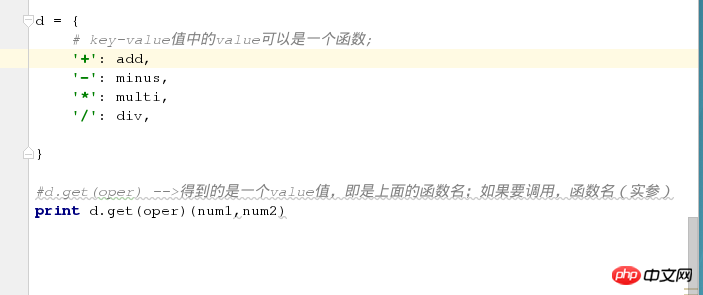
isinstance method:
Format: (element to be judged, data type); return bool value

# 8. The default parameters of the function cannot be variable parameters
As shown below:
should Each time the output is called, an END is added to the empty list; the output is always an END; but it is actually being appended, so variable parameters cannot be used
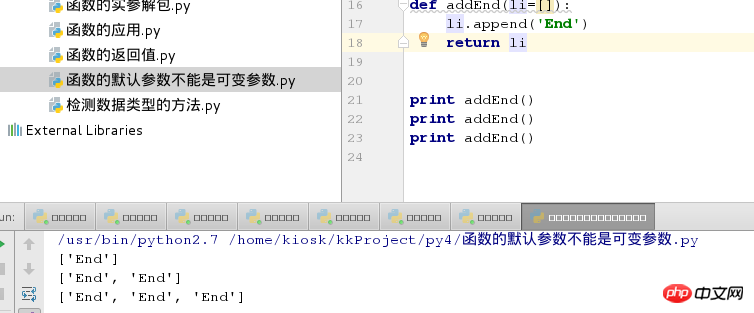
The above is the detailed content of In-depth anatomy of Python functions. For more information, please follow other related articles on the PHP Chinese website!

Hot AI Tools

Undresser.AI Undress
AI-powered app for creating realistic nude photos

AI Clothes Remover
Online AI tool for removing clothes from photos.

Undress AI Tool
Undress images for free

Clothoff.io
AI clothes remover

AI Hentai Generator
Generate AI Hentai for free.

Hot Article

Hot Tools

Notepad++7.3.1
Easy-to-use and free code editor

SublimeText3 Chinese version
Chinese version, very easy to use

Zend Studio 13.0.1
Powerful PHP integrated development environment

Dreamweaver CS6
Visual web development tools

SublimeText3 Mac version
God-level code editing software (SublimeText3)

Hot Topics
 How to convert XML files to PDF on your phone?
Apr 02, 2025 pm 10:12 PM
How to convert XML files to PDF on your phone?
Apr 02, 2025 pm 10:12 PM
It is impossible to complete XML to PDF conversion directly on your phone with a single application. It is necessary to use cloud services, which can be achieved through two steps: 1. Convert XML to PDF in the cloud, 2. Access or download the converted PDF file on the mobile phone.
 Is the conversion speed fast when converting XML to PDF on mobile phone?
Apr 02, 2025 pm 10:09 PM
Is the conversion speed fast when converting XML to PDF on mobile phone?
Apr 02, 2025 pm 10:09 PM
The speed of mobile XML to PDF depends on the following factors: the complexity of XML structure. Mobile hardware configuration conversion method (library, algorithm) code quality optimization methods (select efficient libraries, optimize algorithms, cache data, and utilize multi-threading). Overall, there is no absolute answer and it needs to be optimized according to the specific situation.
 What is the function of C language sum?
Apr 03, 2025 pm 02:21 PM
What is the function of C language sum?
Apr 03, 2025 pm 02:21 PM
There is no built-in sum function in C language, so it needs to be written by yourself. Sum can be achieved by traversing the array and accumulating elements: Loop version: Sum is calculated using for loop and array length. Pointer version: Use pointers to point to array elements, and efficient summing is achieved through self-increment pointers. Dynamically allocate array version: Dynamically allocate arrays and manage memory yourself, ensuring that allocated memory is freed to prevent memory leaks.
 Is there any mobile app that can convert XML into PDF?
Apr 02, 2025 pm 08:54 PM
Is there any mobile app that can convert XML into PDF?
Apr 02, 2025 pm 08:54 PM
An application that converts XML directly to PDF cannot be found because they are two fundamentally different formats. XML is used to store data, while PDF is used to display documents. To complete the transformation, you can use programming languages and libraries such as Python and ReportLab to parse XML data and generate PDF documents.
 What is the process of converting XML into images?
Apr 02, 2025 pm 08:24 PM
What is the process of converting XML into images?
Apr 02, 2025 pm 08:24 PM
To convert XML images, you need to determine the XML data structure first, then select a suitable graphical library (such as Python's matplotlib) and method, select a visualization strategy based on the data structure, consider the data volume and image format, perform batch processing or use efficient libraries, and finally save it as PNG, JPEG, or SVG according to the needs.
 How to convert xml into pictures
Apr 03, 2025 am 07:39 AM
How to convert xml into pictures
Apr 03, 2025 am 07:39 AM
XML can be converted to images by using an XSLT converter or image library. XSLT Converter: Use an XSLT processor and stylesheet to convert XML to images. Image Library: Use libraries such as PIL or ImageMagick to create images from XML data, such as drawing shapes and text.
 Is there a mobile app that can convert XML into PDF?
Apr 02, 2025 pm 09:45 PM
Is there a mobile app that can convert XML into PDF?
Apr 02, 2025 pm 09:45 PM
There is no APP that can convert all XML files into PDFs because the XML structure is flexible and diverse. The core of XML to PDF is to convert the data structure into a page layout, which requires parsing XML and generating PDF. Common methods include parsing XML using Python libraries such as ElementTree and generating PDFs using ReportLab library. For complex XML, it may be necessary to use XSLT transformation structures. When optimizing performance, consider using multithreaded or multiprocesses and select the appropriate library.
 How to control the size of XML converted to images?
Apr 02, 2025 pm 07:24 PM
How to control the size of XML converted to images?
Apr 02, 2025 pm 07:24 PM
To generate images through XML, you need to use graph libraries (such as Pillow and JFreeChart) as bridges to generate images based on metadata (size, color) in XML. The key to controlling the size of the image is to adjust the values of the <width> and <height> tags in XML. However, in practical applications, the complexity of XML structure, the fineness of graph drawing, the speed of image generation and memory consumption, and the selection of image formats all have an impact on the generated image size. Therefore, it is necessary to have a deep understanding of XML structure, proficient in the graphics library, and consider factors such as optimization algorithms and image format selection.






